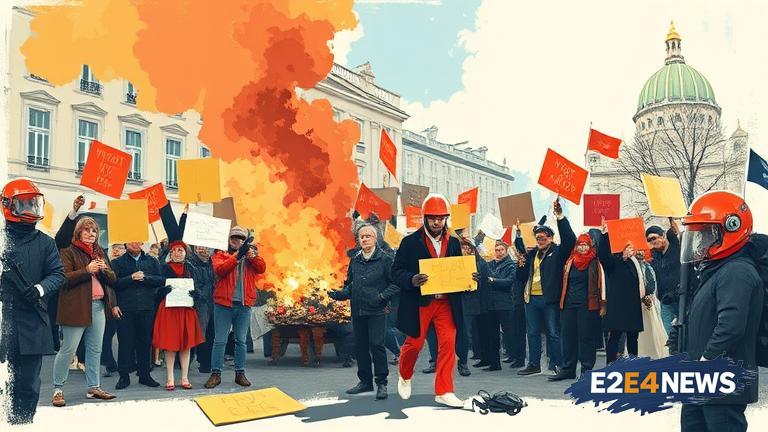The criminalization of protest across Europe has become a growing concern for human rights activists and organizations. In recent years, many European countries have implemented laws and policies that restrict the right to protest, imposing harsh penalties on demonstrators. This trend has sparked widespread criticism, with many arguing that it undermines the fundamental right to freedom of expression and assembly. The European Union has been criticized for its handling of the situation, with some member states accused of using excessive force against protesters. The use of riot control measures, such as tear gas and water cannons, has become increasingly common, leading to injuries and arrests. In some countries, protesters have been charged with crimes such as ‘disturbing the peace’ or ‘inciting violence’, with penalties ranging from fines to imprisonment. The criminalization of protest has also had a chilling effect on free speech, with many people afraid to express their opinions or participate in demonstrations. Human rights organizations have condemned the trend, arguing that it is a threat to democracy and the rule of law. The United Nations has also weighed in on the issue, calling on European countries to respect the right to protest and freedom of expression. Despite the criticism, many European countries continue to restrict the right to protest, citing concerns over public safety and order. However, human rights activists argue that these concerns are often used as a pretext to suppress dissent and silence opposition. The impact of the criminalization of protest has been felt across Europe, with many countries experiencing a decline in public demonstrations and a rise in self-censorship. The trend has also had a disproportionate impact on marginalized communities, who are often already vulnerable to discrimination and persecution. In response to the trend, human rights organizations and activists are calling for greater protections for the right to protest and freedom of expression. They argue that these rights are essential to a healthy democracy and that their restriction is a threat to the very foundations of European society. The European Union has a critical role to play in addressing the issue, and must take steps to ensure that its member states respect the right to protest and freedom of expression. This includes providing guidance and support to countries to develop policies and laws that protect these rights, as well as holding them accountable when they fail to do so. Ultimately, the criminalization of protest across Europe is a complex issue that requires a comprehensive and nuanced response. It is essential that European countries prioritize the protection of human rights and the rule of law, and work to create an environment in which people feel safe to express their opinions and participate in public demonstrations. The future of European democracy depends on it. The situation is being closely monitored by human rights organizations and the international community, who are calling for immediate action to address the issue. The criminalization of protest is not only a European problem, but a global one, and requires a coordinated response from governments, civil society, and the international community. The right to protest and freedom of expression are fundamental human rights that must be protected and respected. The European Union and its member states have a responsibility to uphold these rights and ensure that they are not restricted or suppressed. The consequences of failing to do so could be severe, and could have a lasting impact on European democracy and society. The time for action is now, and it is essential that European countries take immediate steps to address the issue and protect the right to protest and freedom of expression.
